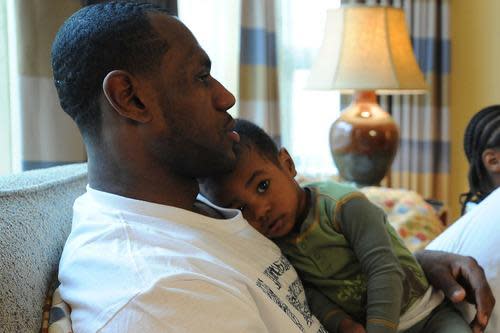LeBron James Says He Won't Let Sons Play Football

LeBron James and son, Bryce, in 2009. Photo by Andrew D. Bernstein/Getty Images
When NBA star LeBron James was in high school, he was known for more than his basketball skills. Back then, the athlete led his football team to the state semi-finals and was an all-state wide receiver. According to sports analysts, James had NFL potential. Still, now that he’s got three young kids—LeBron Jr., 10; Bryce, 7; and newborn Zhuri—he’s not so keen on the sport. In fact, the four-time NBA MVP recently told ESPN reporter Chris Broussard that his sons aren’t allowed to play football at all.
Related: Celtic Rookie Buys Mom a House, Fulfills Childhood Promise
“I was surprised Friday when LeBron told me he doesn’t let his sons play football. Only basketball, baseball & soccer in his house,” Broussard tweeted.
James isn’t alone. Former football stars Brett Favre and Terry Bradshaw and even President Obama have all said they would hesitate to send their kids onto the football field, given the violence of the sport and risk for long-term brain injuries. “I’m a big football fan,” President Obama told The New Republic in 2013. “But I have to tell you, if I had a son, I’d have to think long and hard before I let him play football.”
Related: Soccer Moms, Hockey Dads: Crazy Sideline Stories
And parents across the country seem to agree. According to a 2013 report, participation in Pop Warner, the nation’s largest youth football program, decreased 9.5 percent between 2010 and 2012— that’s a loss of 23,610 players. At the time of the report, Pop Warner’s chief medical officer cited concerns about head injuries as the primary cause of the decline.
Football has made plenty of headlines recently in regards to concussion risk. Earlier this year, the NFL acknowledged that almost a third of retired players will be affected by brain injuries and that these injuries will emerge at earlier ages than in the general population. And this summer, a federal judge approved a settlement deal that would compensate former NFL players for concussion-related claims.
Related: Kids and Sports: Is Training Getting Too Intense?
Dr. Christopher Hogrefe, a sports medicine doctor at Northwestern Medicine in Chicago, says the problem is bigger than just football. “In soccer, the concussion risk is astronomically high. And women’s ice hockey is actually the highest risk of concussion per participant,” he tells Yahoo Parenting. “To limit the concern to football seems shortsighted.”
But Hogrefe, who has three kids himself, doesn’t believe parents need to ban contact sports altogether. “Teaching young athletes how to play these sports makes a huge difference. Like the fundamentals of how to tackle – use your shoulder pads, never have your neck down and forward, it shouldn’t make a loud sound,” he says. “Plus, we’re moving toward less violent sports at young ages. It used to be the case that kids could tackle as young as first grade. Now they play flag football at that age, and in hockey they don’t check in the younger divisions.” These changes have a positive long-term effect, Hogrefe says, since eliminating violent contact in the early years cuts down on cumulative stress to the brain.
Still, parents should make their decisions on a case-by-case basis. “If a child has already had a concussion there is literature to suggest that those kids are at increased risk for future and more significant concussions,” he says. “So parents should assess the medical history of the child and also assess their own comfort level.”
If you do decide to let your kids play contact sports, begin by setting expectations. “Have a parent-coach conference, so you all understand what your child will be taught, and what parents and coaches should look out for in terms of injuries,” he says. “We as parents need to make sure that kids who participate in these sports do so in a safe manner, rather than worrying about them making the SportsCenter Top Ten.”
Just as important as teaching your kids how to play safely, Hogrefe says, is knowing the signs and symptoms of concussions. There’s more to it than just taking a hard hit and losing consciousness — in fact, in most concussion cases, a child doesn’t lose consciousness. Other signs include headaches, nausea, vomiting, and neck pain. But most of all, parents should simply pay attention to their kids. “Parents have an astute ability to see if a child isn’t running the way he usually does, or isn’t focusing in her usual manner,” Hogrefe says. “Key in on, ‘do they look like they are playing the way they normally would?’ That’s something youth athletes can’t fake, even if they want to play so badly that they’re minimizing their symptoms. If you see significant changes in how they play, or their personality, that should ring the alarms.”

